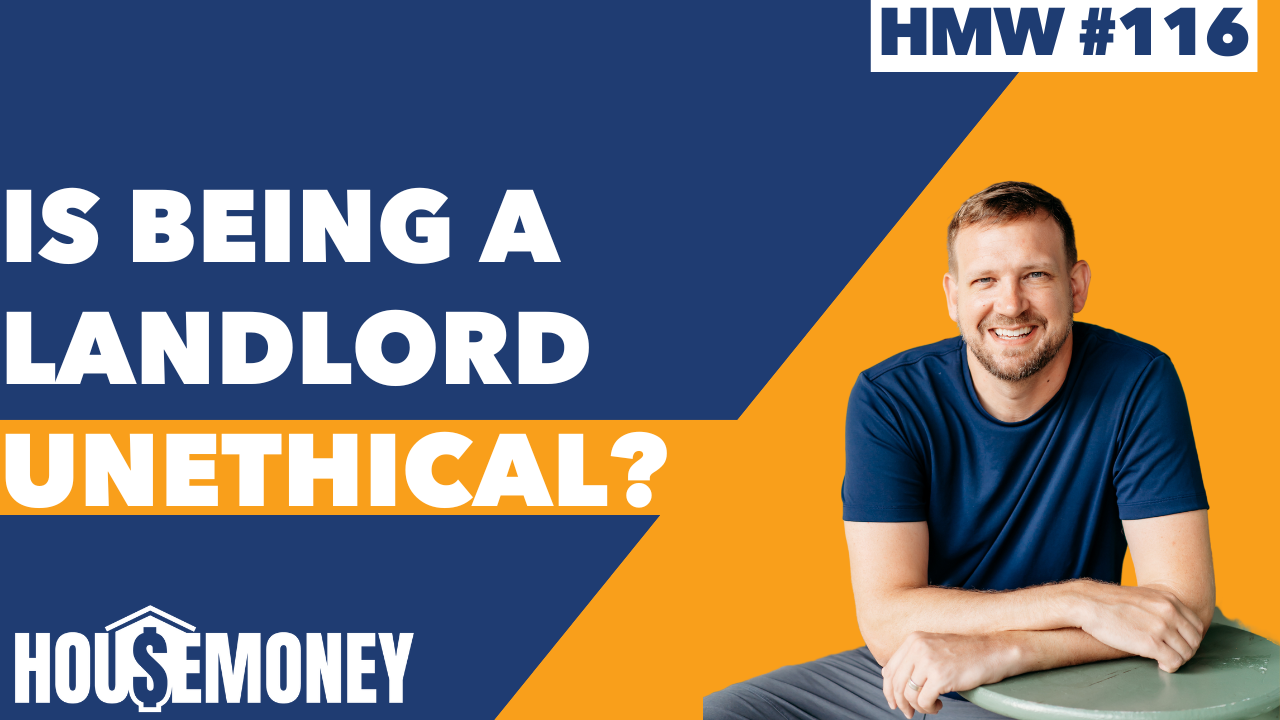HMW #116: Is being a landlord unethical?
Aug 23, 2023
Read Time: 11 minutes
Our favorite sponsors who help keep this content free for you:
Today's issue is sponsored by Jasmine Mortgage Team my preferred residential lender. My team and I have done over 83 deals directly with Jasmine and her team. Work with someone that understands real estate. Book a free 15-minute consultation with Jasmine today.
And Steadily Landlord Insurance, the premier insurance company for landlords of all types. Landlord insurance created by landlords offering dwelling, umbrella, builder's risk, renters, flood insurance and more. Whether you have short-term or long-term rentals, student housing, vacant properties, or other investment needs, Steadily offers fast, affordable insurance quotes.
The noble term landlord has been around for over 600 years and has has mostly been synonymous with people of wealth, business-savvy, and high status.
But in the past few years, I (Alan) often see comments on social media calling landlords greedy, extorters of poor people, and the root cause of our current housing shortage.
So which one is it? Are all landlords Mr. and Mrs. Evil? Is there a way to have Lord of the Land status while simultaneously being a good person?
I'm here to tell you that you can indeed navigate the real estate investing waters as someone that provides a benefit to your local community, rather than a black eye.

Easy, I'm going give you three reasons why, but first... if you think real estate is the business of squeezing every penny out of a tenant, then you don't fully understand how real estate works.
Let's get this out of the way:
Landlords do not determine the price of rent.
Sure, the noble Lords of the Land back in the day may have taken advantage of serfs working the farms and they had little competition or choice and power-hungry Lords could charge whatever fee they wanted. But that's not the business of a modern landlord.
It's akin to another noble title: the Earl. Specifically the Earl of Sandwich, the guy who put meat between bread some 600 years ago too and now we have endless amount of Subway commercials.
Landlord-haters love to taut housing as a human right and properties should be profitless. But along those lines, food should be a right too, and we should burn every owner of a hero-shop at the stake.
Is this an exaggeration?
Well, the franchise Subway does not create the price of sandwiches like a landlord does not create the price of rent. Yes, Subway does create it's own price of sandwiches in a specific store determined by how much it cost to make said sandwich. It's works much like a landlord's business works:
They total up their expenses of:
- Making bread
- Rental cost of storefront
- Wages of their sandwich artists
- Buying meat, cheese, condiments in bulk
- Cost of insurance, franchise fee, and taxes
Maybe this excersise tell us it takes Subway $5 to make a foot-long and they have to charge more to each customer to have a profitable business. So everyone pays $6.25 a sub and the franchise is happy with the 25% markup for the risk, management, and effort it took to sell sandwiches.
Sometimes the cost of making sandwiches goes up 50 cents due to inflation, supply or fee costs, then the price of sandwiches goes up to match. And the consumer gets to make the following choice with each price increase:
- Eat at competitor's and pay $8.50 for for a possibly superior product.
- Go out of their way to eat at a shop that sells a cheaper version for $5.50.
- Sign up for government-backed food stamps to make their own sandwich at home.
- Eat at the Subway where they are because it's the perfect mix of location, price, and quality.
This consumer choice is the definition of free-market, and the same one that landlords also live in. But let's add a little mustard to this analogy:
As a franchise-operator of Subway, if no one is shopping at your store because customers think the price and product are out of whack, you have to choose to either:
- Reduce price
- Change offerings
- Reduce expenses
- Go out of business
They can't just make up any price and extort anyone who eats sandwiches. There are other options out there for people to take their money when they are hungry.
Landlords run the same business model:
- What are the expenses to provide housing?
- How much rent is charged in my market for my location, amenities, and condition of property?
- Is there a least a 20-25% difference for me to make a legit business being an owner/operator?
If so, then buying a property is providing a positive service to the community, and you know this true if your units are quickly filled and tenants stick around. If they are mostly vacant and have high turnover, you as a landlord will have to rework your expenses, or offerings, or be content with going out of business.
Before I force-feed more of this down your throat, are you following me on this so far?

Ok, I'll go a different route then to show you that I'm not "all bread and no meat."
My hunch is if you hate landlords, then really hate your own ability or your own prospects of owning a home one day. (Which we here at House Money Media also hate and why we happily teach for free on our podcasts, blogs, and social media how one can do this a variety of markets and price points. And if you want hands-hand assistance we do offer that for a price too.)
But let's cover some other reasons why trolling-landlords online is most likely misguided:
Reason 1: The house you got outbid on is most likely not profitable for a landlord
You either buy property for lifestyle reasons or investment reasons. Lifestyle reasons all have a premium worked into the sale price: location, schools, local amenities, transportation options, etc. The better of each of these the more expensive it is. These are home buyers bidding on a property because they want their family or themselves to have a certain lifestyle, and they are willing to pay extra to have it and live in the property.
Investors that want to stay in business do not pay extra for these things, because in most cases the rent that can be charged will not cover this premium cost. An investor with multiple homes and years of experience knows that the most money is made on the properties no one wants to buy: in areas of high crime, has a rough commute or ugly exteriors, or just plain outdated or distressed.
Decisions and price to bid on these properties are all driven by a spreadsheet like the cost it takes to build a great sandwich. These bids are investment reasons only and typically nowhere near the hot, trendy, or family-oriented areas and thus no reducing the housing supply of homes for families.
Yes, investors may still buy here but usually it's not a money-making decision driving that choice. It's for a family member, or a future retirement home and not a "let's make as much money as I possibly can because I'm a greedy landlord" reason. These buys are often break-even or even a losing business venture for them for some lifestyle choice they want to make for themselves.
Reason 2: The most profitable ventures for investors take the most work
I know you don't want a boarded up property with a compromised foundation for your family. And that's ok. But there is tremendous value and money to be made here for investors and landlords. Many long-term buy and hold investors get their start buying these cheap and ugly blemishes of a property that no one wants, fix them up, and then rent them out. This, I say, is a huge plus to a community, not a minus, for adding housing to the housing supply. Just because a landlord-hater wants to buy it now that it's not and it's not for sale only for rent, does not make them unethical or greedy or housing savages. They put in the grunt work to add to housing supply and are benefiting from it with a rent price set by the market.
Reason 3: The largest investors with the most properties are not your competition
The biggest landlords in America focus on one-thing: multi-families. These are the easiest types of properties to scale and manage. Big landlords own apartment buildings. You are not losing out on a property because someone has over 300 doors in multiple multi-family buildings. These are the names that make headlines often.
There are big companies buying up entire neighborhoods of single-family and renting them out, but they are nameless hedge funds and Fortune 500 companies, not your mom and pop operators looking for some passive income. They often can afford to keep them vacant for a long time and are indeed detracting from a community. We at House Money Media hate these guys too.
Reason 4: The reason we have low housing supply is probably your Aunt's Facebook vitriol
Research shows that allowing more housing density will make homes more affordable, creates more diverse cities, and reduces commute times by making neighborhoods more walkable. But your Aunt Karen hates everything that is being built nearby that is larger than her home, pickets any and all affordable housing communities being at zoning hearings, or doesn't like that a tall mixed-use apartment building may look into her backyard.
If you can push local governments to allow more detached ADUs (accessory dwelling units), basement units, or mother and law suites then homes can be more affordable as you can live in one unit and rent out the other (called house hacking.) It's simple, we need more supply of housing to reduce property costs, and NIMBYs (Not In My Back Yards) love fighting all actions that will create more housing supply.
Reason 5: Government-housing is a thing and no one likes it
Without the private enterprise of landlords, we would all have the same government housing that has failed time and time again. Thankfully, now local governments have learned to work with private landlords to provide a mix of offerings in their developments and projects and that seems to be working well.
This mix sometimes requires compromise, maybe on price, location, or the ascetics of the building. But it's the step in the right direction. There is no one solution that will please everyone, but do know that these landlords are also adding to communities that would otherwise have vacant lots or boarded up properties attracting nothing but trouble.
Is this providing any comfort that landlording is not only a necessary business, but a very positive one for the majority of communities?

Great.
I'll sum it up for you in 3 easy bullet points.
Summary
- Small time operators make money turning properties around and adding to housing supply
- Putting pressure on zoning boards to increase housing supply is way to make homes affordable
- Investors don't make money in the nice properties you probably are getting outbid on
This convince you now that landlord is a viable career path?

